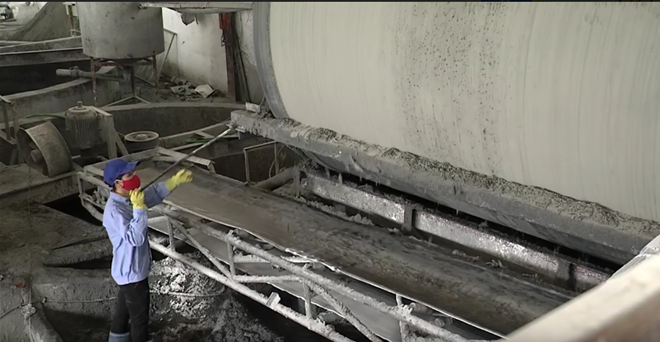Toxic waste turned into money
- Vietnamese tile maker caught dumping waste into river
- Hanoi calls for Austria’s investment in waste treatment
- Thanh Hoa to build $29 million waste treatment plant
- Hanoi to have nation’s biggest wastewater treatment station
- Door-to-door campaign to collect electronic waste launched
This research result was announced on January 21, in Hanoi.
The process of turning gypsum wastes, which negatively impacts environment and human health, into an additive in manufacturing construction materials, has resolved two issues: reducing environmental polluters and creating a cheaper additive in manufacturing construction materials.
Currently, Vietnam has 3 factories, which discharge a huge amount of gypsum wastes. The three plants are DAP JSC, a subsidiary of Vinachem in the Dinh Vu Economic Zone in Hai Phong City; DAP No. 2 JSC - Vinachem in Lao Cai province; and the Duc Giang - Lao Cai Chemicals Joint Stock Company.
 |
| Scientists from Ngoc Linh Company has found the best technological solution, turning phosphor gypsum wastes of Dinh Vu Fertilizer Plant into synthetic gypsum, an additive for cement production. |
Up to now, the amount of untreated gypsum wastes is estimated to be about 5.6 million tons. By 2020, the amount of gypsum wastes is forecast to mount to around 3,885 million tons per year.
According to the complex DAP fertilizer production process, gypsum wastes include HF, H2SO4, H3PO4 salts of heavy metals and even radioactive substances.
Over the past years, DAP Dinh Vu Plant has evidently been found as a big environmental polluter, causing much concern to the public, as the local authorities have detected many environmental violations during its operations.
Against this backdrop, a group of scientists from Ngoc Linh Company has conducted a comprehensive research project, aiming to find the best technological solution, turning phosphor gypsum wastes of Dinh Vu Fertilizer Plant (Hai Phong) into synthetic gypsum, an additive for cement production.
After years of researching, the team has successfully discovered a solution to keeping gypsum discharges from the DAP fertilizer production process in standard quality, and provides first batches of the additive for a number of cement factories, such as VINACONEX Yen Binh Cement; Yen Bai Cement; and Tan Quang Cement.
Apart from protecting environment, the successful work of scientists also has many economic benefits. Vietnam so far has no natural gypsum mine and all gypsum used in the cement manufacturing industry as additive is imported from foreign countries, such as Laos, Thailand and China.
As known, the current price for one ton of domestic-made gypsum is about 600,000 VND, or half of the price of gypsum imported from Laos, Thailand, and 70% of the cost imported gypsum from Oman.

